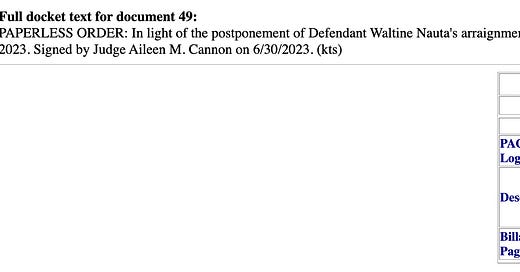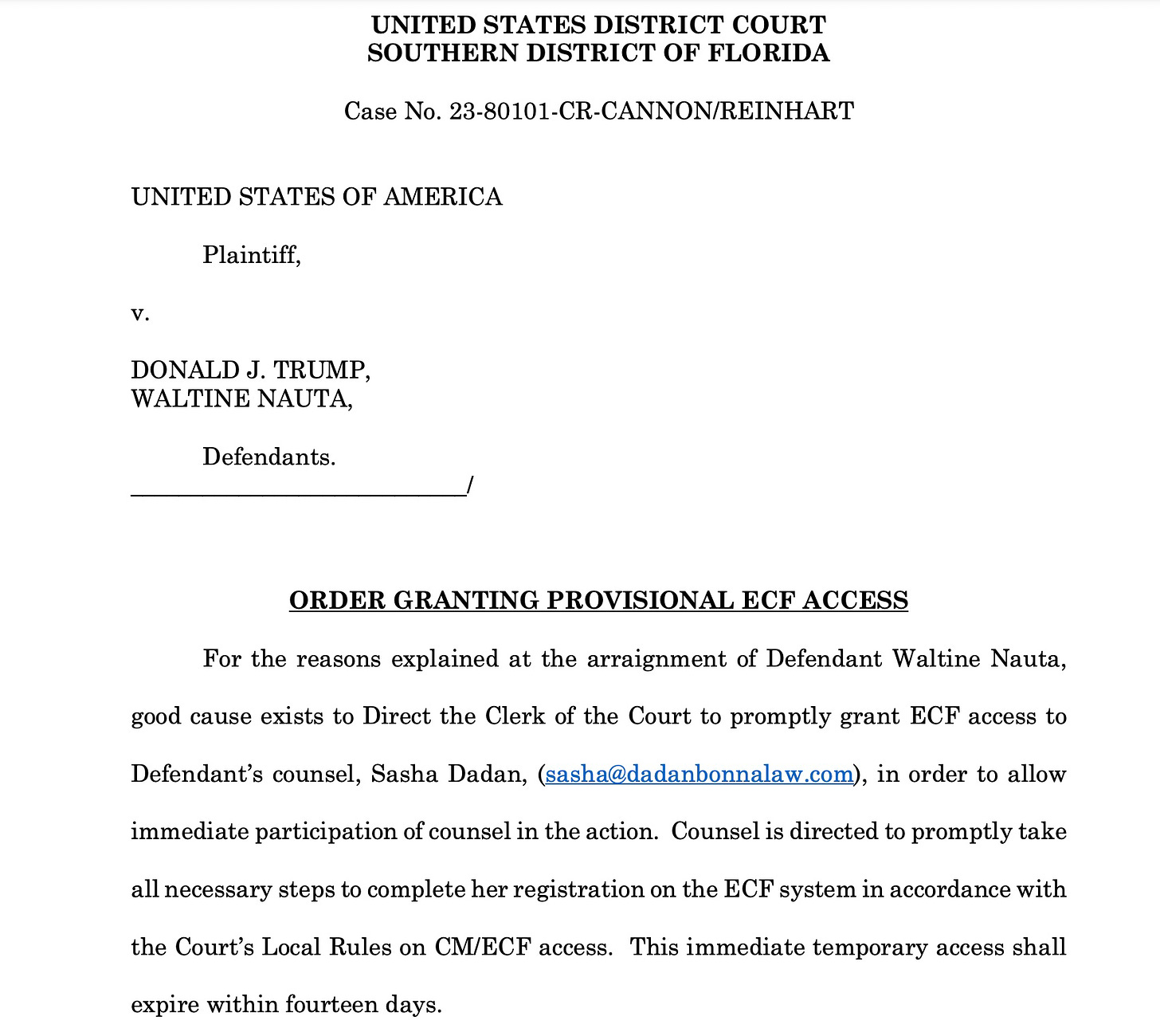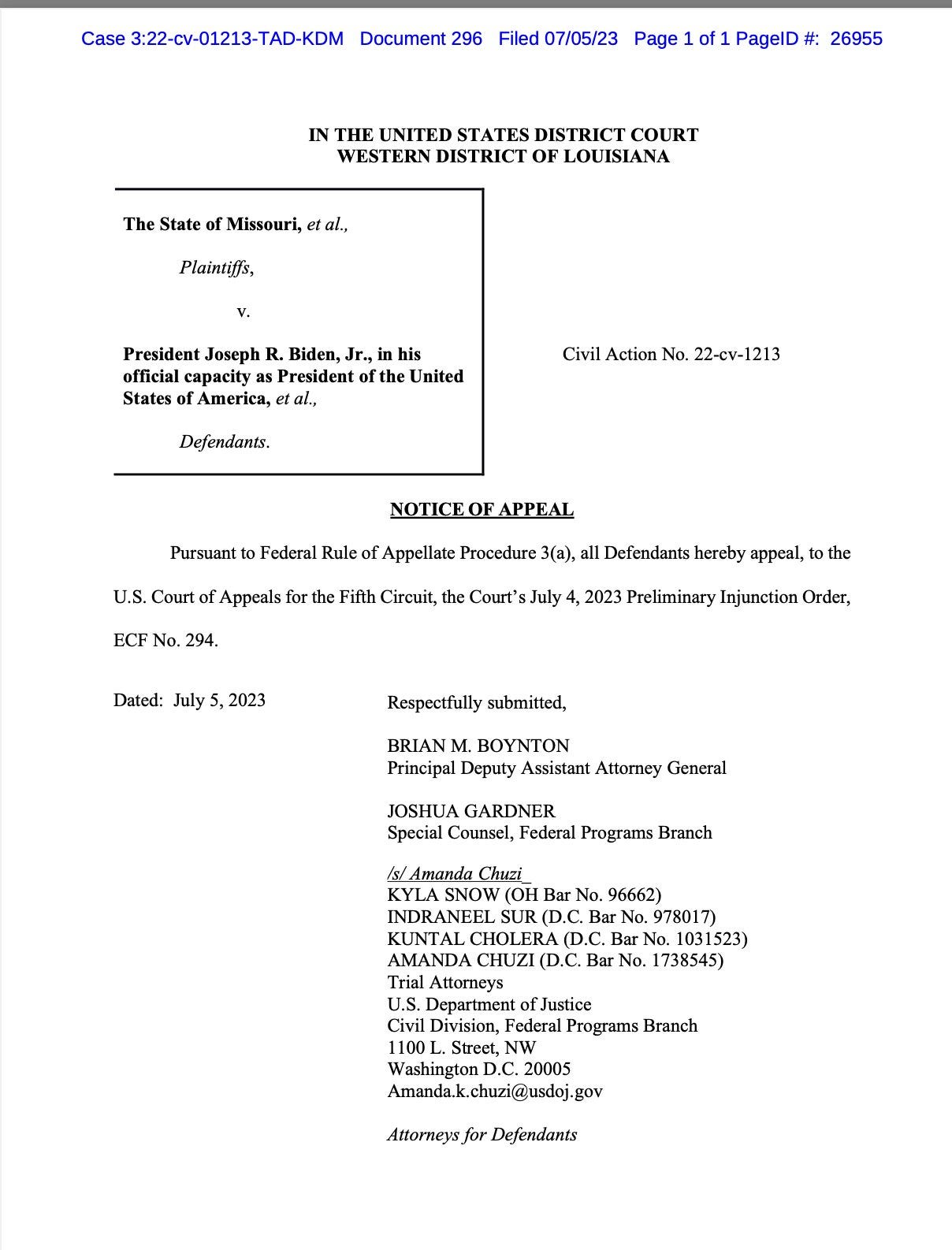Trump’s valet, and now co-defendant, Walt Nauta, finally got arraigned last Thursday after a three week delay, which of course, pushes back other items on the court’s calendar. Most significantly so far, the Judge moved back the due date for defendants Nauta and Trump’s response to the government’s proposed December trial date. The responses are now due on Monday.
You can see the order postponing the due date reflected in PACER, above. PACER is promoted by the court system as “the Public Access to Court Electronic Records (PACER),” and they say that the “service provides electronic public access to federal court records. PACER provides the public with instantaneous access to more than 1 billion documents filed at all federal courts.” In reality, that’s only true if you know it exists, can navigate the system, and are willing to pay for access. It’s as far from an open public system as one could imagine.
The federal judiciary wants Congress to give it $9.1 billion in discretionary funding for fiscal year 2024, an 8.0 percent increase over the fiscal year 2023 appropriation of $8.46 billion. But you won’t find a line item in there for PACER. That’s because the program is funded entirely through user fees set by the Judicial Conference of the United States. So, in a court system that only permits the public to watch proceedings if they can get to the courthouse in question—no cameras allowed in federal courtrooms to permit viewing from distant locations—people must also have a credit card and set up an online account to access cases. It’s easy enough for most lawyers, but trying to find a way through the 94 different federal districts, to say nothing of the bankruptcy courts, courts of appeals and the Supreme Court, can be challenging for a layperson. And while members of the media and academia have begun to assemble publicly sourced workarounds, they are often incomplete or can only offer delayed access to significant pleadings. The system is inconsistent with the transparency values that are supposed to animate democratic institutions—democracy dies in the darkness.
During the lame duck session of Congress in 2020, the House passed a bill to guarantee free access to the public, not by shifting the cost into the judiciary budget, but by putting it on litigants. That financial burden would have exacerbated the David vs. Goliath mismatch in resources among civil litigants, making it more difficult for people of less means to have the same access to justice as large, successful companies or wealthy individuals. The judiciary continues to oppose paying for PACER out of its own expansive budget, even though PACER is housed in the courts’ Case Management/Electronic Filing System (CM/ECF), the federal Judiciary's system that allows case documents, such as pleadings, motions, and petitions, to be filed with the court online.
That system for filing pleadings online is as familiar to lawyers who practice routinely in federal court as PACER is. But here’s an interesting data point: the lawyer it took Nauta three weeks to find, Sasha Dadan, doesn’t have a lot of experience litigating in federal court. That’s apparent because she was not registered in the ECF system when she showed up to represent him. The judge had to enter an order providing her with access and telling her to complete her paperwork promptly (which you would only know if you had access to PACER).
Dadan has an impressive background as an assistant public defender in Florida’s state criminal system. She currently works at a private firm where she does family law cases, which primarily happen in local county and other state courts. She’s even fluent in Spanish. But apparently, she’s never done a federal criminal case in federal district court in Florida, or anywhere else, or even handled a civil case in federal court, or she would have already been registered in the ECF system. If you’re Walt Nauta and you are looking at decades in prison, is that really the lawyer you would choose to handle your case?
Dadan’s appearance in court for Nauta raises questions, especially in light of reporting suggesting that one of Trump’s PACs is paying for Nauta’s legal representation. No matter who pays for a criminal defense lawyer, their obligation is to the client, but there are plenty of former U.S. Attorneys and Assistant United States attorneys in the Southern District of Florida, with lots of federal experience and a strong understanding of the ethical obligations invoked when a third party pays the cost of legal representation in a criminal case, who would presumably be delighted to give Mr. Nauta the representation he deserves. Instead, he has Ms. Dadan, who has great credentials for the work she does, but not necessarily for a case like this. Will Nauta’s team represent his interests if a point in time comes when they diverge from Trump’s, as they almost inevitably will in the course of the prosecution?
That situation may take some time to resolve, but one hearing that does not seem to have been impacted by Nauta’s delayed arraignment (although we could still see a motion to continue from either defendant this week), is the hearing set for this Friday, July 14th. Judge Cannon is set to discuss pretrial issues regarding discovery and handling of classified documents. Trump and Nauta do not have to attend the hearing in person, although it will be the first time their defense lawyers meet with Judge Cannon. Expect most of the substantive parts of proceedings regarding classified material to be frustratingly opaque to the public, necessitated, of course, by the nature of the documents the former president treated so cavalierly in his resort club.
After Judge Cannon receives the defendants’ responses to the government’s request to hold the trial in December, she’ll need to act quickly to establish the schedule, whether it is her original one, something more along the lines of the government’s dates, or a proposal from Trump to delay until after the election, which is inevitably coming. Her current order calls for in limine motions to be filed by July 24, 2023, with a calendar call to consider the motions set for August 8, 2023. The trial date is still set for August 14, 2023. Of course, none of that is happening. The motions in limine, which would be designed in part to challenge admissibility of the classified evidence, can’t be completed because classified discovery hasn’t gotten off the ground and Nauta is barely arraigned. Like any other defendants, they are entitled to sufficient time to prepare a defense. We should know more about the calendar by the end of this week or early next week, unless the judge really wants to cut it close.
The prosecutions of the the former president aren’t the only legal proceedings in the news in the week ahead. Late last week, the Justice Department asked District Judge Terry Doughty in the Western District of Louisiana to stay his order in Missouri v. Biden. The case was brought against the Biden administration by the states of Louisiana and Missouri, and other individuals. In addition to the request for a stay, DOJ has also appealed the judge’s order to the Fifth Circuit Court of Appeals.
Judge Doughty granted the conservative Attorneys General’s request for a preliminary injunction that forbids executive branch agencies and specific employees from engaging in the ongoing conversations they have (and had during the Trump administration) with social media companies. The plaintiffs characterized those conversations as devious exercises in censorship of right wing views and important issue like Hunter Biden’s laptop. In fact, the communications facilitate sharing information about misinformation circulating online, like dangerous Covid remedies or false arguments to discourage people from vaccinating, along with efforts by foreign countries to interfere in elections. The plaintiffs allege the Biden administration is impeding expression of conservative views and the Judge agreed that there was “substantial evidence” of a far-reaching censorship campaign. He called the Biden administration’s routine conversations with social media companies “an almost dystopian scenario” and wrote that the government “seems to have assumed a role similar to an Orwellian ‘Ministry of Truth.’ ”
In its motion to stay Judge Doughty’s order while the case is on appeal, the government argues that preventing ongoing communication with social media companies would cause grave harm and that their conduct is entirely lawful and responsible conduct. The response from the Attorneys General of Missouri and Louisiana is telling. They wrote, “In essence, Defendants argue that the injunction should be stayed because it might interfere with the Government’s ability to continue working with social-media companies to censor Americans’ core political speech on the basis of viewpoint…In other words, the Government seeks a stay of the injunction so that it can continue violating the First Amendment. The motion for stay should be denied.”
It’s tough to find a First Amendment violation here. Government practice is to make social media companies aware of misinformation circulating on their sites, but to leave any decisions about removing information up to them, in accordance with their own policies. There is no evidence social media companies were threatened in the course of these talks. We will undoubtedly be hearing more about the case this week, as the motions to stay and the appeal get underway. The plaintiffs chose to file the lawsuit in Judge Doughty’s district. He is known for his rulings against requiring vaccination in certain industries and settings during the pandemic. The government faces appeal, yet again, in the conservative Fifth Circuit.
Finally, the new session of the Fulton County, Georgia grand jury starts this week. Tuesday is the earliest theoretical date we could see an indictment. However, that period of time continues into August. We’ll have to wait longer to learn precisely what “imminent” means to a Georgia district attorney, but we are now formally back on indictment watch. If district attorney Fani Willis indicts, that will make it three for the former president. And the special counsel’s January 6 investigation looks like it’s in high gear. Ryan Reilly and Michael Mitsansis at NBC News have a great piece reviewing all of the witnesses who have made their way in front of the grand jury to testify. Smith seems committed to leaving no stone unturned as he investigates.
We’re in this together,
Joyce







"Smith seems committed to leaving no stone unturned as he investigates."
Does that include Roger Stone?
Joyce, you are so cogent it brings tears of joy to my eyes.
Saying is a busy summer isn't the half of it. Between politics EVERYWHERE and life in general plus Canadian fires/ thick smoke and the Danish <nope, Dutch!> government collapsing, Israel.. massive changes in online communities.... well, if you don't like change and mystery, get a van and a sleeping bag and skip society altogether for a few months!
Please everyone take care of your health, sleep, eat right, be kind to as many people as you can...we all need some!
Thrilled to find your substack, Joyce, thanks a million.
Mimi